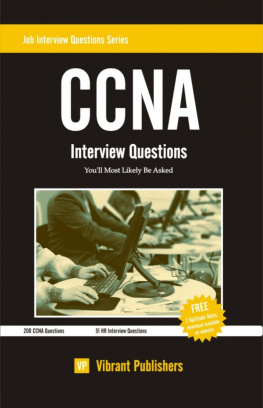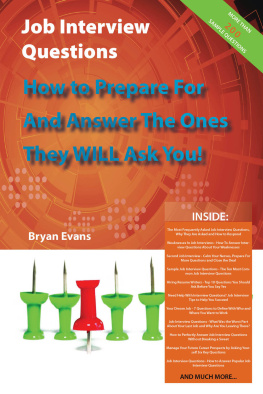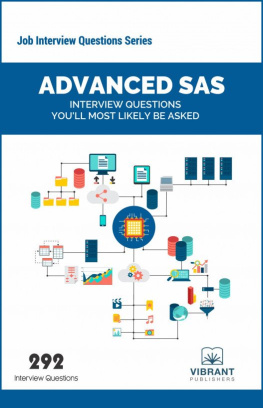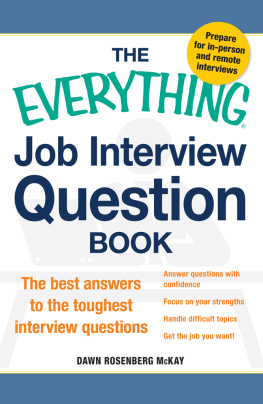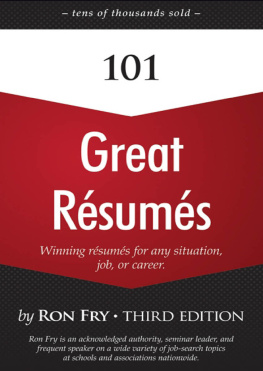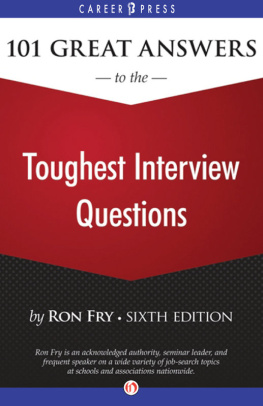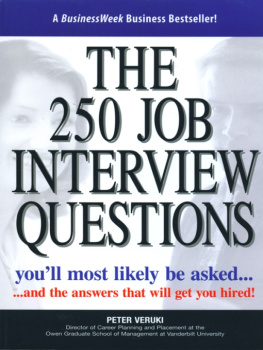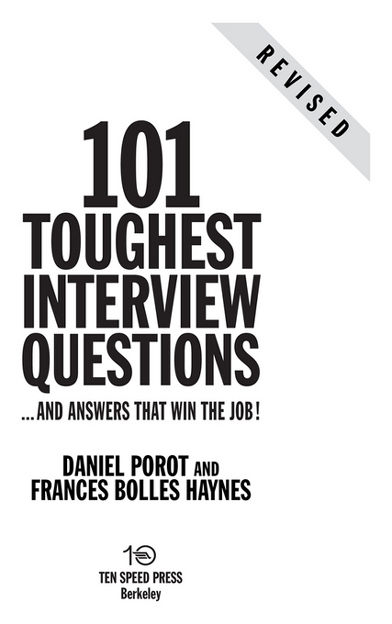Copyright 2009, 1999 by Daniel Porot and Frances Bolles Haynes
All rights reserved.
Published in the United States by Ten Speed Press, an imprint of the Crown Publishing Group, a division of Random House, Inc., New York.
www.crownpublishing.com
www.tenspeed.com
Ten Speed Press and the Ten Speed Press colophon are registered trademarks of Random House, Inc.
Library of Congress Cataloging-in-Publication Data Porot, Daniel, 1941
101 toughest interview questions:and answers that win the job! / Daniel Porot and Frances Bolles Haynes. Rev. ed.
p. cm.
Summary: A list of 101 commonly asked job interview questions with sample answers, plus interviewing tips and strategiesProvided by publisher. 1. Employment interviewing I. Title. II. Title: One hundred and one toughest interview questions. III. Title: One hundred one toughest interview questions.
HF5549.5.I6.P67 2009
650.144dc22
2009018652
eISBN: 978-0-307-83202-3
v3.1
This book is dedicated to the thousands of people who shared with us their genius, originality, enthusiasm, and knowledge about how to answer and react positively to the toughest questions they were asked in interviews. We are thankful to all of them.
CONTENTS
LIST OF QUESTIONS
INTRODUCTION
Not many people like to be surprised, surprisingly enough! Most of us prefer to know what were getting into so we can prepare ourselves. This holds true for things good and bad. Even happy occasions like surprise birthday parties can throw people off balance. We arent comfortable with events and circumstances out of our control, so its no wonder that most people get nervous when they think about interviewing for a job. We fear what will happen if we dont perform well, especially because our actions and behavior in this brief encounter can profoundly affect our future.
The good news is that we can take measures to minimize the fear and dread associated with interviewing. By preparing ourselves for what is likely to happen, we can replace our feelings of discomfort and anxiety with calmness and confidence. We wrote this book to help job hunters familiarize themselves with commonly asked interview questions so they can begin the process of formulating appropriate responses. Of course, not all of these questions will be asked in every interview, but its a safe bet that youll hear a fair number of them. When job hunters contemplate what they might be asked, put together thoughtful, well-reasoned answers, and then practice delivering these answers, they will perform much better during interviews and increase their chances of being hired.
Preparing well for an interview enables you to respond exactly as you intend and to impart exactly the information you wish to impart. When the playing field is fairly level and there are many similarly qualified candidates, an employer may choose someone else over you because he or she is more qualified or better suited to the company culture; however, you never have to lose your chance at a job again because you did not prepare adequately. Like everything in life, interviewing for a job is a skill that requires practice. Even with natural talent, opera singers, actors, and major league pitchers all work hard to perfect their craft. Being good at whatever you undertake demands preparation and dedication.
In this day and time, its hard to imagine that anyone would set foot into an interviewers office without considerable preparation. Yet, in what can be one of the most crucial and future-shaping activities we faceinterviewing for a jobpeople often proceed blindly, with little preparation. It is easy (and costly) to assume that the skills required to perform a job are the same skills necessary to interview well for that job. A person can bea highly skilled engineer or a superb marketing manager, but if she lacks the ability to convince an interviewer of her competence and skills, she will likely lose the chance to get the job for which she is best suited.
To interview successfully, it is essential that you know what information interviewers need from you to make their decision, and you must be prepared to offer it easily, without making them dig for , we explore these strategies and how they can make an interview interesting and successful.
Knowing what kind of questions you will likely be asked makes all the difference in your attitude and confidence as you approach your interview. With that in mind, we present the 101 toughest interview questions you can expect to encounter, and provide sample responses on the reverse side of the page for each question. Do not merely memorize the answers and spout them back verbatim to an interviewer; instead, use them as jumping-off points to start thinking about how you can answer the question in a way that reflects who you are. As you read the questions and responses, carefully think about your own experiences and skills and formulate an answer that is specific to you. If your answers sound canned and dont ring true to you and your experiences, an interviewer will likely pick up on this and think that you are dodging the question. Good interviewers will keep asking the question in different forms until they get what they think is an honest answer from you. The bottom line is, giving canned, impersonal, or untruthful answers will do more harm than good.
As you consider each question in this book, write down concrete examples from your professional life to help you create a response that is uniquely yours. If one of the sample answers applies to you or your experience, you may want to use it as a basis for your answer and then expand on it, tailoring it to reflect your particular qualifications or history. Some of the sample responses will not apply to you; if so, do not run the risk of using any of them to answer a question. The best answer is one that allows you to provide specific information and examples that best reflect who you are and what you can do.
Instructions
As you anticipate potential questions that you might be asked in an interview, read through the 101 questions (but not the sample answers) and select those that would be the most difficult or challenging for you to answer. Any question that you dread being asked is one that you should prepare for thoroughlytake extra time to contemplate your response and then practice delivering it confidently and articulately. If you fear a specific question or type of question, always make time to deal with it before you are sitting across from the interviewer. You dont want to be in the position of struggling to answer a challenging or uncomfortable interview question, especially if you were fairly sure it would come up. Be ready to tackle the hard stuffgaps in your career, problems with bosses or coworkers, whether you are overqualified or underqualified, why you left your last job, and so on. You cant stop the interviewer from asking these questions, but you can diffuse your anxiety by being ready.
Once you have made a list of the questions you find challenging, write down an answer that you might give to an interviewer for each one (but dont look at the sample answers yet). After you have written down your responses, go to the question and read through the sample answers. Select one or two answers that you like best, then see how they compare to your own. Choose the answer that best fits you and your situation, then practice your response until you are comfortable and sure you will remember it. If your answer is significantly different from the sample responses, check with trustworthy people who know you wellfriends, relatives, present or past coworkers, and so onto see how they respond to your answer and if they have any constructive feedback to offer.


